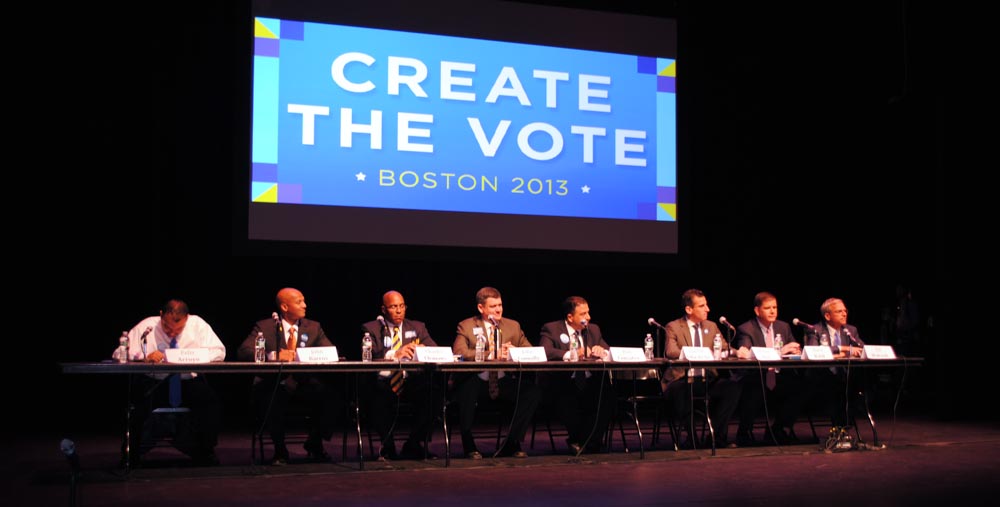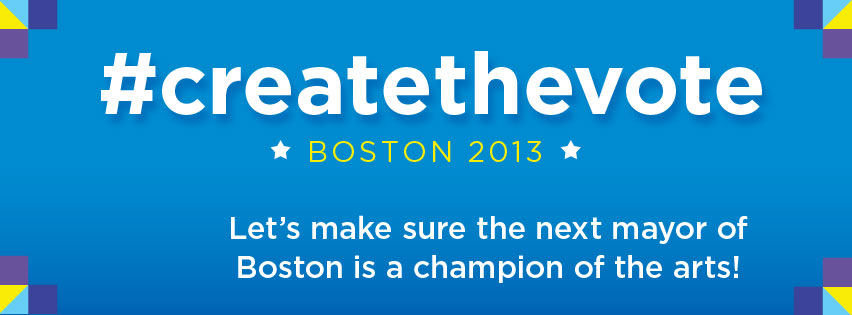
In 2013 the city of Boston faced a significant transition: Thomas M. Menino, mayor for the past 20 years, was retiring—and 12 candidates were facing off in the primary. Capitalizing on this great opportunity, MASSCreative launched a comprehensive campaign to make arts support a priority in the mayoral race: #CreateTheVote.
MASSCreative Case Study: #CreateTheVote 2013
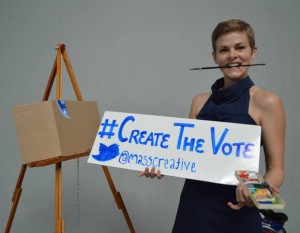 1. Set Goals
1. Set Goals
Short-term goals: clear and achievable
- Elect a mayor who prioritizes arts and culture in Boston.
- Use the election to unite and energize the Boston arts and culture community to build a strong coalition for change in the future.
Long-term goals: more aspirational
- Increase financial resources and develop stronger policies for arts and culture in Boston.
- Increase the capacity of the arts and culture sector to effectively advocate for the arts.
- Increase public will for the arts in Boston.
2. Strategize
MASSCreative asked these questions to develop their strategy:
- What is the change we are seeking? Is it political? Legal? How do we attain real change, not just a public relations solution?
- What venues will we use to organize supporters and fight for the recognition of the arts as essential to our city’s fabric?
#CreatetheVote focused on ensuring the election of an “arts mayor,” leveraging voter and arts sector engagement. This meant working within the mayoral election cycle.
3. Target Decision Makers
MASSCreative identified two primary decision makers:
- The Candidates: MASSCreative wanted arts and culture to be front and center on each candidate’s platform and list of priorities.
- The Voters: MASSCreative wanted voters to have arts and culture at the forefront of their minds when they entered the voting booth.
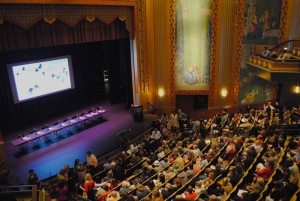 4. Power Map
4. Power Map
A power map helps you figure out who and what will influence your decision maker. Who affects their thinking? Who helps them decide their priorities? Who and what are they responsive to? MASSCreative’s power map included four sectors: voters, press, candidates, and money.
5. Develop Engagement Tactics
 Voters
Voters
MASSCreative spread the word to parents, youth artists, working artists, staff, board members, donors, and arts lovers.
- They ran an outreach campaign asking people to prioritize arts and culture in their voting. They tracked how many voters signed up online and made the commitment, sharing the information with press and candidates.
- They also created “Arts Voter” pins that people could wear to show their support and memes to share online.
- They encouraged stakeholders to engage in “art dogging” their candidates—asking them questions related to arts and culture at every stump speech and public event. If candidates hear the same questions over and over from potential voters, they begin to include those topics in their everyday talking points and platforms.
Press
- MASSCreative hired a political press consultant and pitched stories, placed editorials, and established themselves as a valued contributor to arts conversations in the public eye.
- They held a huge #CreatetheVote Forum for all of the mayoral candidates, emceed by TV reporter Joyce Kulhawik (a high-profile Boston arts personality) and attended by 700 people. Multiple press outlets attended and covered the event. The forum made the candidates’ positions on the arts highly visible—emphasizing to them that the public cared and was watching.
Candidates
MASSCreative met with each candidate, bringing along representatives of local arts groups. At these meetings, candidates filled out questionnaires about their arts platforms. For those who needed guidance, MASSCreative helped them think about what matters to voters, build relationships with arts organizations, and publicize their arts agendas. The result was a strong arts platform from nearly every candidate, which MASSCreative shared widely via traditional and social media.
Money
MASSCreative engaged major foundations, universities, and political donors to help with #CreatetheVote. This ranged from having major donors call candidates, to partnering with major Boston foundations to promote and lend their financial support to arts activities, to getting arts-friendly philanthropists to attend the Create the Vote Forum.
Throughout the campaign, MASSCreative used stories and narratives to illuminate the arts and culture sector, invited arts leaders to participate.
Mass Participation: MASSCreative created campaign actions that made it easy for large numbers of people to participate. They prepared petitions, drafted emails, call scripts, and social media content (e.g., tweets, memes, etc.), and designed collective activities, such as creating hand-made signs that read “Arts matter to me because _____,” encouraging people to post photos of to Facebook.
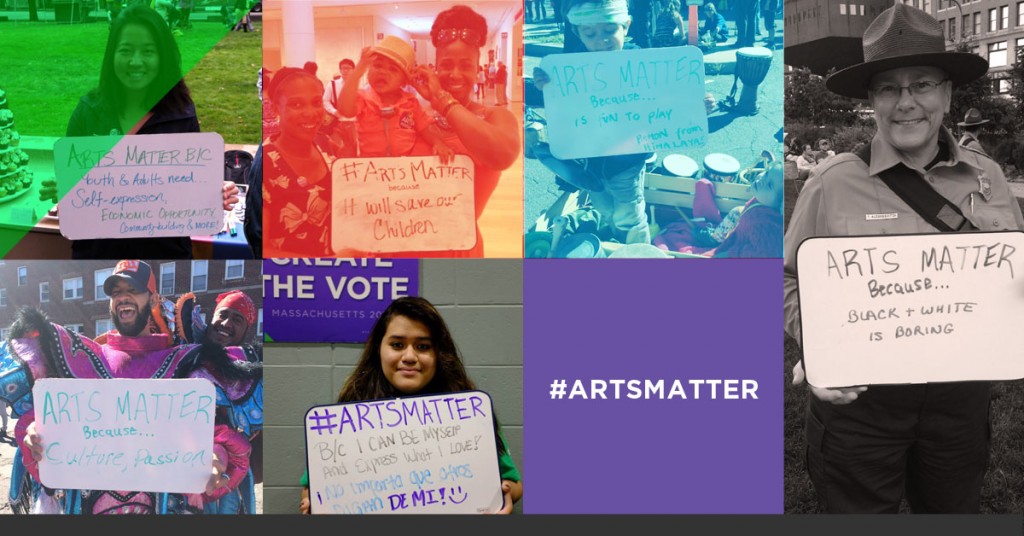
Training: Arts leaders, youth artists, funders, and other groups gathered to be trained on:
- crafting powerful personal stories (‘Storytelling for Change‘)
- meeting with elected representatives
- understanding what motivates and interests political candidates
- basic advocacy strategy
- designing and running social media campaigns
- designing questionnaires for political candidates
- collecting and using data for advocacy
6. Set a Timeline
MASSCreative identified which activities were manageable, timely, and achievable, and mapped out a calendar of activities to build momentum as voting day grew closer.
Leading up to Election Day, MASSCreative engaged candidates and voters at every step of the campaign, elevating the discussion about arts and cultural issues.
July
- MASSCreative issues Arts & Culture Questionnaires to the Boston mayoral candidates.
- Create the Vote campaign kickoff event held at the Cyclorama at the Boston Center for the Arts.
August
- MASSCreative and Create the Vote Coalition meet with each of the candidates.
September
- MASSCreative holds the Create the Vote Forum on Arts, Culture, and Creativity with the mayoral candidates and over 600 attendees.
- Primary election September 25: Voters get to the polls and narrow the field to two candidates.
October
- MASSCreative holds two Create the Vote Forums for the arts community, one with each of the final two candidates.
November
- Get Out the Vote: MASSCreative shares public education materials on its website and encourages the arts community and Boston voters to get out to the polls.
Create the Vote Outcomes
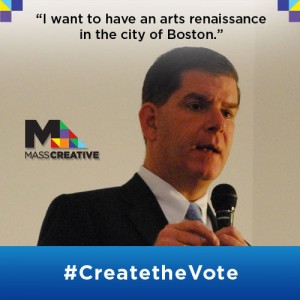 Boston voters elected Marty Walsh as their new mayor in 2013 and many referred to him as an “arts mayor”—a descriptor he embraced. Mayor Walsh committed to a strong arts platform, and in his first two years he hired Julie Burros, Boston’s first Cabinet-level Chief of Arts and Culture. With the help of area funders and thought leaders, Burros led Boston Creates, a city-wide cultural planning process. Mayor Walsh also increased the Boston Cultural Council budget and hired an arts-friendly Superintendent for Boston Public Schools, Dr. Tommy Chang, who took the helm at BPS in 2015.
Boston voters elected Marty Walsh as their new mayor in 2013 and many referred to him as an “arts mayor”—a descriptor he embraced. Mayor Walsh committed to a strong arts platform, and in his first two years he hired Julie Burros, Boston’s first Cabinet-level Chief of Arts and Culture. With the help of area funders and thought leaders, Burros led Boston Creates, a city-wide cultural planning process. Mayor Walsh also increased the Boston Cultural Council budget and hired an arts-friendly Superintendent for Boston Public Schools, Dr. Tommy Chang, who took the helm at BPS in 2015.
